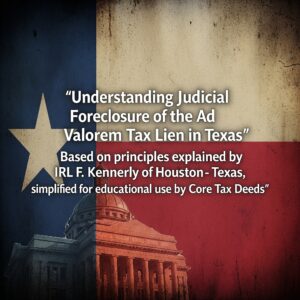Understanding Judicial Foreclosure of the Ad Valorem Tax Lien in Texas

Based on principles explained by IRL F. Kennerly of Houston, Texas, simplified for educational use by Core Tax Deeds.
When someone owns real estate in Texas, they must pay property taxes each year. These taxes are called “ad valorem” taxes, meaning the amount is based on the value of the property. If the property owner doesn’t pay those taxes, the local government has a legal right to collect what’s owed.
This is done through something called a tax lien. The government places a claim on the property and, if the taxes still aren’t paid, the government can foreclose on the property. In Texas, this process is done through the courts. It’s called judicial foreclosure.
This article will explain what judicial foreclosure is, how it works in Texas, and why it creates unique opportunities for investors.
What Is an Ad Valorem Tax Lien?
An ad valorem tax lien is created when property taxes go unpaid. Every year, counties and taxing entities in Texas assess the value of real property. Based on that value, they charge property taxes. If the taxes are not paid by a set deadline, the county places a lien on the property.
This lien gives the taxing authority the right to collect the unpaid amount. If necessary, they can sell the property at auction to recover what is owed.
The Role of Judicial Foreclosure
Texas is one of the states that uses a judicial foreclosure process for enforcing tax liens. This means that the county or taxing authority must file a lawsuit in a district court. The property owner and any other parties with a legal interest in the property are named in the case.
If the court agrees that the taxes are unpaid and due, the judge will issue a judgment allowing the property to be sold at public auction. This process helps to ensure that ownership is properly transferred and that certain legal protections are in place.
The auction typically happens on the first Tuesday of each month, and with 254 counties in Texas, there are frequent opportunities for investors to participate in these sales.
What Happens at Auction
When a property is sold through judicial foreclosure, the county sells it to the highest bidder. The opening bid is usually the amount of taxes owed, plus penalties, interest, and legal fees. The winning bidder receives a Sheriff’s Deed.
This deed gives the investor a strong claim to the property, but it may still be subject to what’s called a redemption period.
Understanding Redemption Rights
In Texas, most residential properties sold at tax deed auctions come with a redemption period. This gives the original property owner a chance to buy back the property, even after it’s sold at auction.
Here’s how it works:
- If the property is redeemed within the first 180 days, the original owner must pay the investor the full purchase price plus a 25% penalty.
- If the property is redeemed between 180 days and 2 years (for some properties), the penalty increases to 50%.
These fixed penalties are set by Texas law. That means the investor either receives a strong return on the money invested (if the property is redeemed), or gains full ownership of the property after the redemption period ends.
Why Judicial Foreclosure Matters to Investors
For investors, the judicial foreclosure process provides several key advantages:
- Legal Clarity: Because the sale is overseen by a judge, it helps clear up many title issues. This creates cleaner ownership than in some non-judicial states.
- Predictable Schedule: With monthly auctions in every Texas county, there is a steady flow of opportunities.
- Fixed Return Rates: Texas sets the redemption penalties in law (25% or 50%), which can make outcomes more predictable.
- Real Property Collateral: These investments are backed by real estate. Investors either get paid back with a premium or take title to a physical asset.
Managing the Risks
While the potential returns are appealing, it’s important to understand the risks and do your due diligence:
- The property might be redeemed later than expected or not at all.
- Investors must research title issues, existing liens, and condition of the property.
- Legal and administrative steps must be followed carefully to ensure the investment is protected.
That’s why Core Tax Deeds uses a thorough process that includes title research, site inspections, legal reviews, and clear communication with our investor base.
Why Texas Is Unique
Texas stands out among tax deed states for several reasons:
- High redemption penalties compared to other states.
- Monthly auctions in all 254 counties, providing many chances to invest.
- Judicial process creates more reliable title transfer.
These features make Texas an attractive state for those interested in real estate-backed investments.
Final Thoughts
Judicial foreclosure of ad valorem tax liens in Texas creates a legal pathway for counties to recover unpaid property taxes while also offering investment opportunities to the public. The process is structured, transparent, and backed by state law.
At Core Tax Deeds, we specialize in identifying these opportunities, evaluating the risks, and guiding our investors through the process with transparency and care.
If you’re interested in learning more, visit www.coretaxdeeds.com or check out our offering portal at invest.coretaxdeeds.com.
This article is for educational purposes only and does not constitute an offer to sell or a solicitation of an offer to buy securities. Investment opportunities are offered under Regulation Crowdfunding (Reg CF) through a registered intermediary. Past performance is not indicative of future results. Please consult your own legal or financial advisor before investing.
